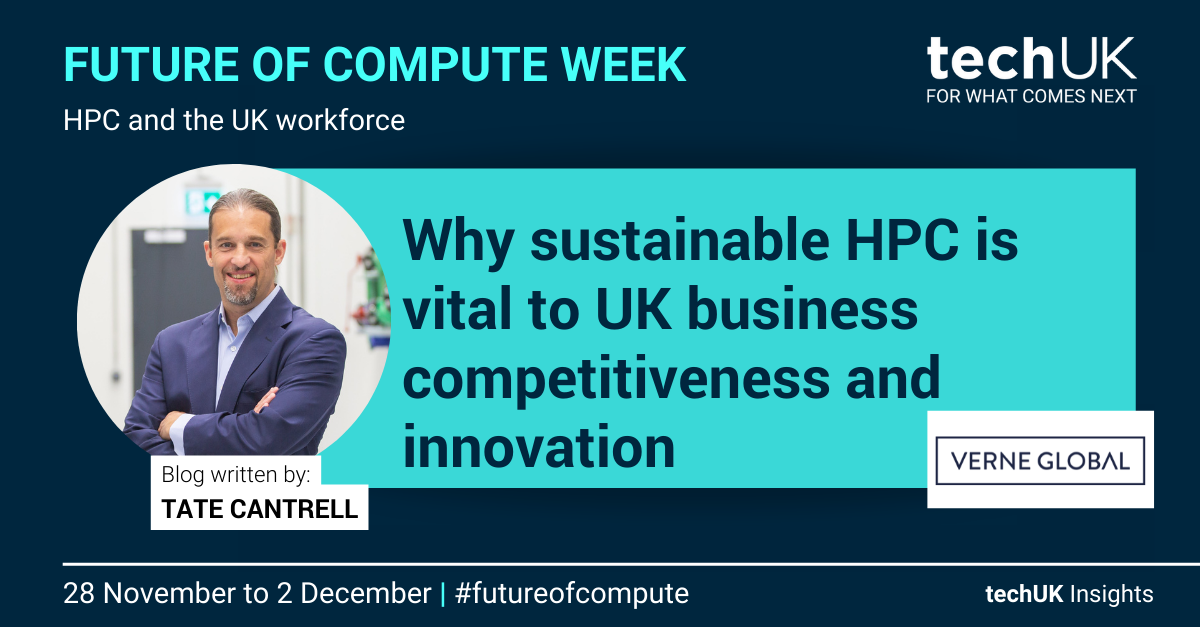Why sustainable HPC is vital to UK business competitiveness and innovation

In simple terms, HPC (high performance computing) furthers the human cause with scientific analysis powered by the fastest computers on the planet. To put this power in perspective, the typical desktop or laptop with a 3 GHz processor can perform around 3 billion calculations per second, but the fastest HPC computers can perform quintillions of calculations per second – bearing in mind that a quintillion is a billion billion.
Growing demand for HPC
HPC has long been used by UK academic bodies and research labs to enhance research accuracy and the timely delivery of results. Now, HPC is driving innovation across industries, ranging from manufacturing, engineering and pharma, to finance, media and retail. In fact, the worldwide HPC market now totals $41 billion, and it is estimated that HPC budgets will grow to $59.2 billion by 2026, per Intersect360 research.
But alongside this growth in HPC is an increased awareness about the carbon impact of power-hungry supercomputers. For instance, Cambridge University is home to some of most sophisticated supercomputers in the world, and HPCWire reports that its researchers have been working to make more efficient use of supercomputing cycles, already doubling the energy efficiency of its Wilkes3 supercomputer.
UK companies pioneering sustainable HPC
What’s more, it isn’t just academia that is making sustainable HPC a priority. Wirth Research is one example of a UK company utilising green HPC to help companies innovate and improve their efficiency and sustainability. Founded in 2003, with its roots in F1 motorsports, Wirth Research is an engineering and design technology consultancy that uses cutting-edge Dynamic Thermal Modelling (DTM) and Computational Fluid Dynamics (CFD) to solve energy consumption issues – reducing inefficiencies in HGV transport and supermarket refrigeration – and guide designs that improve airflow, reducing airborne infection risk indoors and minimising wind disruption around skyscrapers that can make walking difficult for pedestrians.
CFD is extremely power-intensive, and to perform its high-resolution analyses, a high intensity computing environment capable of supporting trillions of calculations a second is required. Given that sustainability is a key part of Wirth Research’s core mission, the company has prioritised finding ways to increase the efficiency of its energy-intensive operations. This ranges from maximising the efficiency of their computational models and hardware and energy consumption, to relocating their compute to Iceland, namely to Verne Global’s data center campus, where it is powered by 100 percent renewable energy.
Another UK-headquartered company, Peptone, a research and development firm for protein-based drugs, like vaccines, is utilising sustainable HPC to make ground-breaking scientific discoveries. Combining biophysics, HPC and machine learning, Peptone is unlocking the potential of ‘intrinsically disordered proteins’ – proteins that lack a fixed or ordered structure – to develop novel therapeutics that will target these previously undruggable proteins. This work requires capturing, storing and analysing huge amounts of data, orchestrated and supervised by reinforcement learning algorithms, and is compute and energy intensive.
Understanding the potentially harmful impact of HPC to the environment, Peptone sought to avoid housing it in a less energy efficient location, such as on-premises or in a fossil-fuel powered urban data center. As is the case for the vast majority of enterprise applications (around 85 percent), Peptone’s applications are not latency sensitive, which allowed the company to move their HPC to a green data center powered by renewable hydroelectric and geothermal energy sources. This has decreased the carbon footprint of Peptone’s compute markedly and enabled it to maintain industry-leading levels of electrical efficiency.
Conclusion
From dramatically increasing our ability to analyse weather patterns and update financial trading algorithms based on the most recent market data, to accelerating prototype design in everything from semiconductors to shampoo, HPC is at the heart of commercial competitiveness.
As UK organisations continue to grow their high-performcance computing, it’s imperative to ensure they are optimising it for efficiency, and whenever possible, utilising renewable power to drive their innovation. By making smart choices as to where and how the infrastructure supporting their HPC is operated, enterprises can ensure that continued progress and innovation doesn’t come at an untenable cost to the environment.

Rory Daniels
Rory joined techUK in June 2023 after three years in the Civil Service on its Fast Stream leadership development programme.

Laura Foster
Laura is techUK’s Associate Director for Technology and Innovation.

Elis Thomas
Elis joined techUK in December 2023 as a Programme Manager for Tech and Innovation, focusing on AI, Semiconductors and Digital ID.

